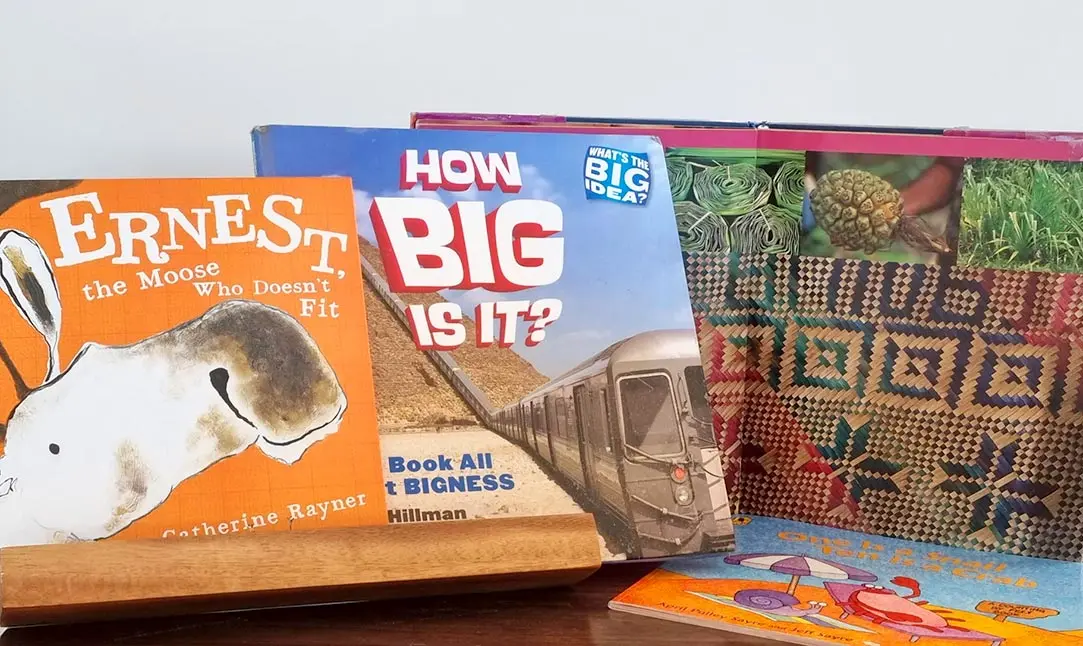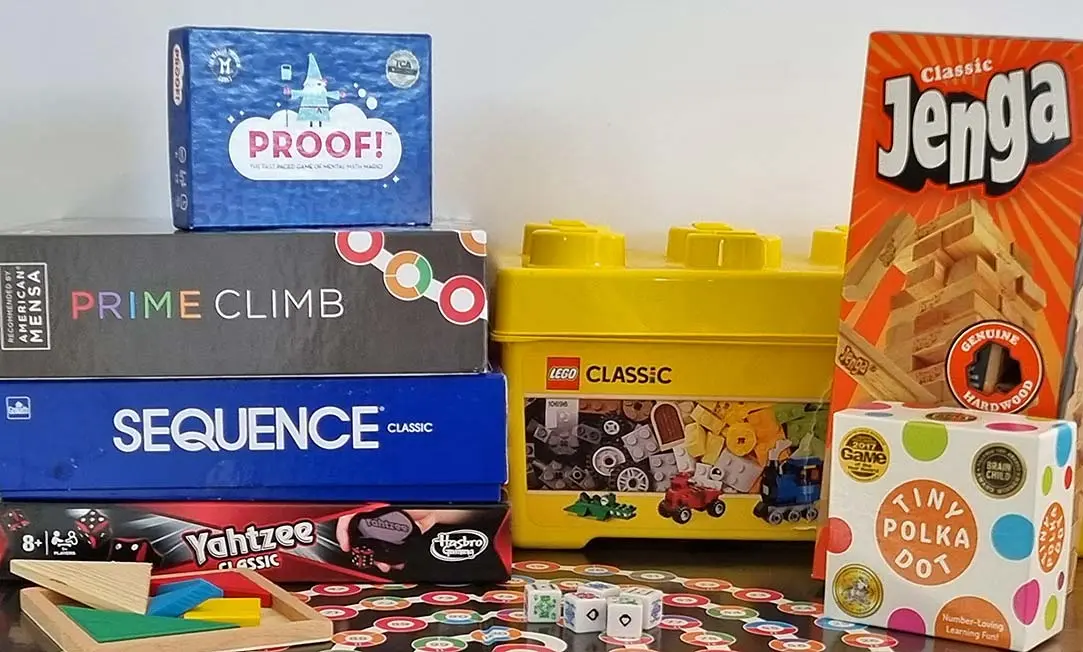Celebrating mathematics in your school library
Discover some great resources to bring mathematics into the school library to help showcase it for the fun, engaging, beautiful subject it is.
Mathematics and libraries are a perfect fit!
For some people, mathematics and libraries might not seem like an obvious fit. But for me, the wonder, curiosity, freedom and beauty of both libraries and mathematics make a perfect fit.
I'm so excited that the week of 7–11 August 2023 is both the Aotearoa New Zealand School Library Week and Maths Week.
Aotearoa NZ School Library Week is a week to celebrate school libraries. It's a chance to showcase all that they offer to promote and support reading engagement as well as a love of learning.
Maths Week is designed to celebrate, inspire and spark interest in mathematics for ākonga throughout Aotearoa New Zealand.
There are many ways to bring mathematics into the library that make it more lively, fun and interesting for everyone.

Finding mathematics in books
I love reading and I love mathematics and when younger, I felt like had to choose between the two. The good news is that we don't have to choose. There are so many books that involve mathematics that aren't just about mathematics — they have great storylines, characters and messages.
Picture books
Picture books introduce and show mathematical concepts in an engaging visual way. No ākonga is ever too old to be read a picture book. Picture books can break down and provide a starting point for exploring some of those tricky mathematical concepts.
Some of my favourites are:
One Is a Snail, Ten Is a Crab by April Pulley Sayre and Jeff Sayre, illustrated by Randy Cecil
Press Here by Hervé Tullet
Fifty-Five Feathers by Ben Brown and Helen Taylor
Ernest, the Moose Who Doesn't Fit by Catherine Rayner
The Rabbit Problem by Emily Gravett.
Other books
Books about mathematicians and books that highlight mathematics positively could also be promoted. These books can support ākonga in developing a positive mathematical identity.
Try these:
Hidden Figures by Margot Lee Shetterly
An Abundance of Katherines by John Green
The Curious Incident of the Dog in the Night-Time by Mark Haddon
Eddie Woo: Superstar Maths Teacher by Rebecca Lim
The Magic of Maths by Kjartan Poskitt
October Sky by Homer Hickam.
Ways you could use books
Create a list of books you have in the library that could be used and read by teachers.
Create a display of books, when placing the books think about patterns, towers or squares.
Classification is a big part of libraries and mathematics. Let ākonga classify a group of books. What do they think is the best way to group the books — by colour, size, shape, topic, Dewey number, or alphabetically? If you're feeling brave, let them do a shelf or a section of the library and keep it this way for the week!
Read aloud to classes as they visit the library this week. As you read aloud, ākonga could keep track of how many times a certain word is read. They could then make a graph of the frequency of these keywords.
Places to find books
You may be surprised by the number of books that you have in your collection that support mathematical concepts. Some titles will be well-known and obvious, others will be hidden gems you may be unaware of. To help you in the hunt for books you may already have in your collection (or titles you may want to borrow), use the lists below:
Search Finding mathematics in books to find titles with mathematics.
Look for books with mathematics in our Schools Lending Collection (you can borrow these through our lending service).
Picture books with mathematical content — from nzmaths.
Things to do
Board games
Board games work a treat for encouraging ākonga to think like a mathematician without them realising they are thinking like a mathematician.
Some great games I have played recently are:
Prime Climb
Uzzle
Proof!
Sequence
Set.
These games have strong mathematical concepts and allow for collaboration between ākonga. They also encourage the use of strategy and logic.
Board games can create a buzz as several ākonga talk to and challenge each other. I love the sight of two ākonga pondering over a chessboard.
Do not forget the classic board games such as Monopoly, Battleship, Backgammon and a solid game of cards.

Mathematics-based activities and competitions
Your library could host mathematics-based activities and competitions. This can be a great way to get ākonga excited about mathematics and encourage them to visit the library. And once they are in the door, make sure they leave with a book in their hand.
The possibilities of activities you can do in a library are endless.
Here are some activities your ākonga may like:
Sudoku — a number logic puzzle involving placing the numbers 1–9 so that every row, column and grid of a square has the numbers 1–9. There are beginner to expert-level sudokus.
SOMA cubes — a 3D dissection puzzle. The SOMA cube has seven distinct SOMA pieces that you fit together to create a 3x3 cube.
Tangrams — a Chinese geometrical puzzle. A square has been cut into 7 shapes that are then combined to make various shapes. Tangram puzzles can be simple or complicated.
Lego challenges.
Pixel art — create a bigger image out of small squares. Post-its are great for this.
Jigsaw puzzles.
A collaborative Sierpinski Pyramid (YouTube video, 14:43). Who doesn't love a good fractal?
Taking photos of where you see mathematics in the community, in nature and in the library.
Participate in the national sport of Niue — darts.
Te ao Māori
Te ao Māori is a world rich in history, stories, art, song and performance.
When I put on my mathematics glasses and look at this world, I see a beautiful place where mathematics is alive and living. It has jumped off the pages of books, out of the walls of classrooms and is mathematics in action.
Tukutuku panels, kōwhaiwhai, haka, waiata-ā-ringa, navigation, kī-o-rahi and Matariki are all examples of where Māori instinctively use mathematics. They show repetition, symmetry, spatial awareness, patterning, sequencing, algebra, ratios, shapes and transformations.
Books to support
The Schools Lending Collection has a growing collection of books that explore te ao Māori. These are just a few that could support you:
Te Kāpehu Whētu | The Star Compass by Kate Souness
Matariki: The Star of the Year by Rangi Matamua
Whai: String Games by Kiwa Hammond, illustrated by Adele Jackson
Fun With Flax: 50 Projects for Beginners by Mick Pendergrast, photographs by Maureen Lander
Ngā Aro-Tākaro: 100 Māori Games Artefacts by Harko Brown and Yves Tennessee Brown
Ngā Taonga Tākaro | Māori Sports and Games by Harko Brown.
Borrow these books through our lending service.
Activities that explore mathematics in te ao Māori
Some ideas to try could be:
whai (string games)
raranga (weaving)
tī rākau (stick games)
Mū Tōrere (strategy board game).
Websites
Here are some useful websites to find enticing mathematics-based activities:
Maths Week website — provides access to new resources for ākonga to engage in mathematics. Once you register to this website, you can access daily and week-long activities.
Youcubed — an American website run by Stanford University, Professor Jo Boaler and her team of ‘youcubians’. There are many rich mathematical activities that, while easy to set up, challenge students. This site also has amazing posters about having positive mathematical mindsets.
Which one doesn’t belong? — a website that provides visual images. Ākonga use mathematical reasoning to explain why one of the images does not belong with the rest. There is not one specific answer or one image that does not belong. It seriously makes me think of the Sesame Street song ‘One of these things is not like the others’.
National Library resources
Check out our online resources to find information and digital resources to support learning about mathematics.
Topic Explorer has Maths.
Many Answers has:
Talk, talk, talk!
Talk and questioning are a massive part of mathematics. Talk allows ākonga to share and develop their thinking and is an opportunity to help ākonga connect what they are doing to mathematical concepts. Talk with ākonga as they are reading, playing, creating or doing.
The goal of questioning is to let ākonga think about and engage with the mathematics. If we often think of a good author, we say they have shown, rather than told, the reader. It is the same with mathematics. We want to use questions that open up the thinking of ākonga rather than lead them down a predetermined path.
Here are some questions to open up talk about mathematical concepts like orientation, position, pattern, shape, size, space, differences, similarities:
What do you see?
What do you notice?
What do you wonder?
What do you know?
What further information do you need?
What would you like to know more about?
What could you do differently?
What would you do next?
Collaborate with others!
Most importantly, connect with the mathematics teams in your schools. See what they are doing to celebrate Maths Week 2023. How could you support what they are doing? Or, how could they support what you are doing?
Let libraries be a part of a revolution in Aotearoa New Zealand so that we can immerse ākonga in a world where mathematics is alive, everywhere, fun and engaging.